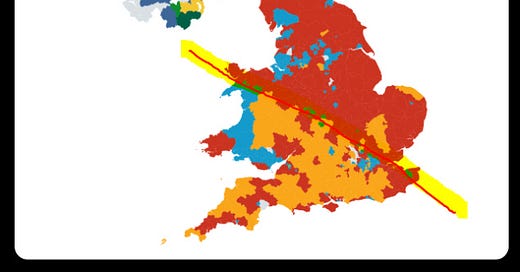Of Birmingham and tedium: The linguistic detectives department
Do the French really use “Être de Birmingham” to mean “being bored”? Also: how the Danelaw still haunts British politics.
Two things I wrote in early summer…
Back in June, the screenwriter Ollie Masters tweeted a lovely review of my book:
This is fantastic. Reminded me of Bill Bryson at his best. Full of such pure, infectious curiosity about the world with a heavy dose of humour. If you haven’t already, make sure to pick up a copy
(He’s right! Amazon, Waterstones, Stanfords, Foyles, Bert’s Books.)
Anyway, I was delighted by this – delighted enough that I’d asked Ollie not to waste it on a private message after he’d DMed it to me, which is why he’d tweeted it in the first place. Partly this was because it’s just a lovely thing to read; partly it’s because pre-nimby Bill Bryson is a bit of a hero of mine,1 and his books have exactly the vibe I aspire to. But also, it was because it reminded me of a thing that was not about the election even slightly, thus enabling me to write about that instead.
In his 1990 book on the English language Mother Tongue, Bryson noted that the French used the phrase “être de Birmingham” to mean, roughly, “to be bored out of your mind”. I’d always found it amusing, if a bit distressing, that the city’s reputation extended that far, and went on to use the fact in a 2016 CityMetric article about how everyone ignores the place. When I went to write it up though I couldn’t locate a second source. Since then, more than one French friend has said they’ve never even heard the phrase. When Sathnam Sangera tweeted his discovery of the same line a few months back, a lot of people told him the same thing.
And so, I assumed, Bryson was either wrong, or winding us up. Occam’s razor was that there’s no such phrase.
Well – it turns out that there actually is. The phrase is archaic, and didn’t mean quite what Bryson implied. But it does seem to have been real.
The origins of the phrase seem, according to this post on Olivier Genevois’ Les Mots Délicieusement Surannés (“Deliciously old-fashioned words”), to lie in razors. Kirby, Beard & Co started out life in Gloucester in 1743, as a manufacturer of pins, needles and fish-hooks; by the mid 19th century, though, its head office had relocated to Birmingham, and it was selling higher class goods like jewellery, too, from its shops in the most fashionable cities of the age.
Today, the fact its trademark included the phrase “London, Birmingham, Redditch and Paris” sounds silly, in exactly the same way the Trotter brothers’ “New York, Paris, Peckham” does. In the mid 19th century, though, Birmingham was one of the world’s major manufacturing centres, and a Parisian gentleman in want of a fancy razor would make his way to Kirby, Beard & Co’s store at 5 Rue Auber. A razor from Birmingham was a mark of good workmanship; and so, being compared to a razor, or to something from Birmingham – “être rasoir” or “être de Birmingham” – colloquially came to suggest something good quality, stolid, reliable.
But, as the fact that you’re all still sniggering at that trademark reminds us, the meaning implied by an object or place name can change. There’s a good joke about this kind of change in one of the Back to the Future films, when Doc Brown, from 1955, complains that it’s no wonder something failed, it says “made in Japan”; meanwhile Marty, from 1985, looks baffled. Over time, the implications of being a razor or from Birmingham shifted in the opposite direction, from positive to negative; over time, they came to imply that something workmanlike, mass-produced.
Or, to put it another way, boring.
So it was never that Brummies or their city itself were considered boring: it’s that, for a while, manufactured goods from the city were so successful in France that its name came to carry the meaning of “tedious ubiquity”.
Today, “être rasoir” is still used to mean “to be bored”, while “être de Birmingham” seems to have been consigned to history. But it was real, even if it seems to have applied less to the experience of being bored than to the things doing the boring. I apologise to Bill Bryson for ever doubting him.
I should thank Isa Roughol, Chris Burden and Jordan, whose surname I seem to have misplaced, for helping me piece this story together with my bad schoolboy French. And please feel free to correct any errors below.
Map of the week: “The Vikings cast a long shadow” edition
Friend of the newsletter Alasdair Rae has discovered a new dividing line in British politics. South of a diagonal line from Mersey to Thames, the second placed party in English seats 2019 was generally the LibDems. North of it, it was generally Labour. (I say English, not English and Welsh, because what looks like an enormous block of yellow in Wales is actually only two geographically large seats.)
The fascinating thing about this is that this is almost exactly the line dividing the Viking-ruled Danelaw (in the north) from Anglo-Saxon rule by the kings of Wessex (in the south) in the late 9th and 10th centuries. That ran along the rivers Thames and Lea, then to Bedford and on via the River Ouse to Watling Street; though whether it was a proper border or more of a permeable frontier zone, is not exactly clear.

I have absolutely no idea why this Thames/Mersey line should still be affecting politics a thousand years after the Danes stopped being a significant factor in British politics. It seems more likely to be a function of geography rather than genetics, although I could not for the life of me tell you how, and more likely still to be a total coincidence. Either way, though: cool.
If you want to read more stuff like this/support the kind of nerd who writes it, then as ever paying subscribers get more things, much earlier!
If you can’t afford to pay then just hit reply and you can have a freebie. Really, it’s not a trick; if you already did this and I didn’t reply it’s because I missed the email, just kick me again.
But if you can, here’s a convenient button to help with that:
And if you enjoyed all that, you might also enjoy my book which also, as it happens, makes a brilliant Christmas present:
Also now available in North America!
My lovely agent Antony, who is also, as it happens, Bill Bryson’s agent, told me this week that he’d handed a copy of 47 Borders to the great man and he said it looked very interesting. This is probably all the feedback I will ever get on the matter, but nonetheless it’s been making me beam for days.





